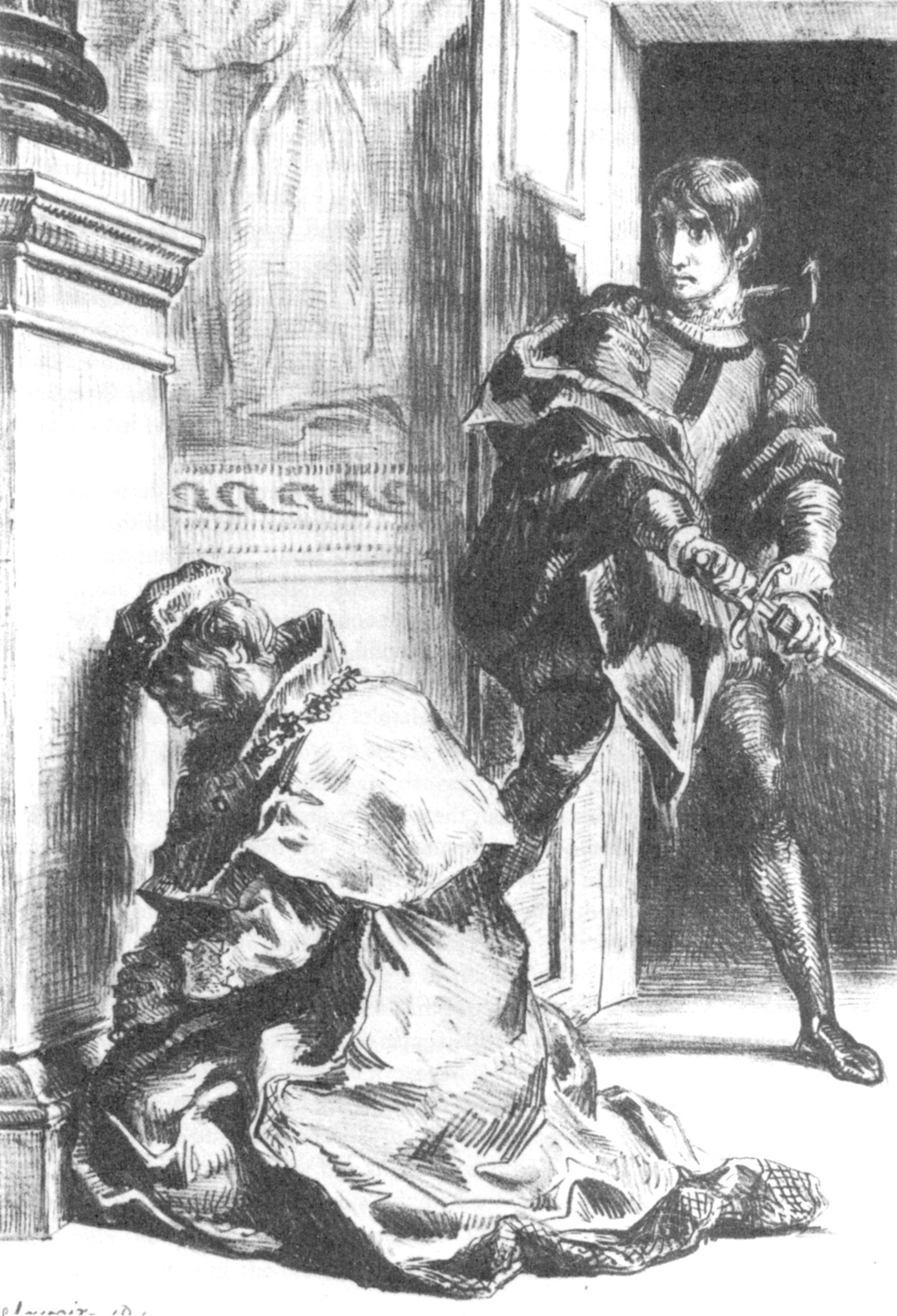
Why is it, do you think, that so many stories feature orphans as their main characters?
Seven Evil Uncles of Fiction
The Evil Uncle is a well-established and familiar form in fiction, and has been since – well, let’s take a look, shall we?
The classickest of evil uncles, to my mind, is Hamlet’s Uncle Claudius, who kills his brother (Hamlet Senior), steals his brother’s wife (in that order) and usurps the throne which was rightfully Hamlet Senior’s and is now rightfully Hamlet Junior’s. Confronted with this heaping pile of villainy, he feels a modicum of remorse (see Act III, Scene iii) – but not enough to actually try to put things right to the extent that he still can.
 Slightly younger than Uncle Claudius is Uncle Richard, aka the Duke of Gloucester. (Only slightly younger – c. 1592 as opposed to c.1599-1602. Not 1485 – I am putting him in the fictional category as Shakespeare’s version doesn’t adhere all that closely to historical fact. Probably because he was writing under the rule of the grand-daughter of the man who killed (and replaced) Richard.) Shakespeare’s Richard orphans one niece and nephew, marries off the former to a nobody and imprisons the latter, has two other nephews murdered, and tries to marry another niece. That is a bad uncle.
Slightly younger than Uncle Claudius is Uncle Richard, aka the Duke of Gloucester. (Only slightly younger – c. 1592 as opposed to c.1599-1602. Not 1485 – I am putting him in the fictional category as Shakespeare’s version doesn’t adhere all that closely to historical fact. Probably because he was writing under the rule of the grand-daughter of the man who killed (and replaced) Richard.) Shakespeare’s Richard orphans one niece and nephew, marries off the former to a nobody and imprisons the latter, has two other nephews murdered, and tries to marry another niece. That is a bad uncle.
Zipping on two or so centuries, to the late 1830s, we come to Kate and Nicholas Nickleby’s Uncle Ralph, a cold-hearted Scrooge of a man who uses his niece as bait for objectionable men and tries to ruin his nephew. He veers from the classic mould in not actually killing his brother (possibly because his brother doesn’t have a throne), but he doesn’t give a damn that he’s dead, either.

C.S. Lewis furnished the world with two fine examples of the Evil Uncle genus. First (in 1951), Prince Caspian’s Uncle Miraz, who returns to the purity of the classics by killing his brother and pinching his crown – as well as planning to kill the rightful heir. Unlike Claudius, however, he does not pinch his brother’s widow, being already married to the hilariously named Prunaprismia.
Lewis’ second example is the magician who has the nephew in The Magician’s Nephew (1955) – Digory’s Uncle Andrew. A fool, perhaps, but an ambitious, meddling and arrogant fool, which to my mind qualifies him for the title of an Evil Uncle.
“Men like me, who possess hidden wisdom, are freed from common rules just as we are cut off from common pleasures. Ours, my boy, is a high and lonely destiny.”
As he said this he sighed and looked so grave and noble and mysterious that for a second Digory really thought he was saying something rather fine. But then he remembered the ugly look he had seen on his Uncle’s face… and all at once he saw through Uncle Andrew’s grand words. “All it means,” he thought to himself, “is that he thinks he can do anything he likes to get anything he wants.”

So far the list of Evil Uncles seems to be dominated by the fruitful minds of the male of the species: two of Shakespeare’s, two of Lewis’, and one of Dickens’. But now, at last, we come to an Evil Uncle from the mind of a woman.
The woman in question is Ellis Peters, creator of Brother Cadfael, and also of Iveta de Massard’s Evil Uncle Sir Godfrid Picard (from The Leper of Saint Giles, 1981). He may be further from the murdering, throne-stealing Claudian mould than many of the above, but he’s still prepared to force his niece to marry a rather nasty man who is older than her father, purely for his own financial gain. And to blackmail her into pretending to like it by threatening the life of a young man she cares for. In short, a rotter.
The final Evil Uncle of the list is due to make his appearance in January 2018. Also from the mind of a woman (mine, in fact), he follows the classic mould in killing his brother to seize the throne, and trying to kill the rightful heir as well. (Why mess with a winning combination?)
 It is perhaps worth noting that of the first six Evil Uncles on the list (spoilers!), five are dead by the time the tale is wound up. I decided to be boldly different, and as a result, the death of Princess Lily’s Evil Uncle Phelan is announced before Chapter One is wound up. But of course, that’s not the whole story…
It is perhaps worth noting that of the first six Evil Uncles on the list (spoilers!), five are dead by the time the tale is wound up. I decided to be boldly different, and as a result, the death of Princess Lily’s Evil Uncle Phelan is announced before Chapter One is wound up. But of course, that’s not the whole story…
What fictional Evil Uncles have I missed? Feel free to add entries to the list below!
The Waiting List
I have never been honest with myself about my stack of books waiting to be read. In fact, I have been so far from honest about it that there isn’t even a stack. Not because I have it all in the form of e-books (I am a paper-lover, myself) but because I have cunningly hidden them all on the bookshelves among the books I have read.
I had a look this afternoon and was horrified to find that I own seventy-four unread books. Seventy-four. Take a minute to let that sink in. If I read one every week, that would last me til April 2017. If I did come clean and make an actual stack out of them, it’d probably be taller than me.
That isn’t counting reference books or the Stephanie Pearl-McPhee one I bought today. Or most of the Caped Gooseberry’s books, because I don’t plan on reading most of them (e.g. An Introduction to Abstract Algebra, Vol. I). Just to look a little legit, however, I did count the books I have started, but not yet finished.
Shall we look at the breakdown?
Non-fiction was far and away the largest section, with a whopping 44 books awaiting my attention, on subjects ranging from bookbinding to religious drama to the history of Europe to a book simply titled On Killing. (Not, you will be happy to learn, a DIY book.)
Fiction I broke down into Classics, General and Sci-Fi/Fantasy, since that’s how I shelve them. I have seven unread classics (including War and Peace, naturally) and seven unread members of the general fiction class.

In case you were wondering, my test for what constitutes a classic is whether they bother to give you a nice binding. Bog standard binding? Not a classic.
There were only five unread sci-fi/fantasy novels, mostly due to buying a series which I am working through slowly.
I also have eight unread children’s books – those are the ones I intend to read myself, rather than keep for the convenience of visiting children – and a paltry three books of unread poetry or plays.
The question that then arose – “then” being after I’d recovered from the shock – was why all these books were unread. The reasons, of course, differed. Some I haven’t had for very long, like the Moomin book; others are just hard to get through. Like War and Peace. Others I feel I really ought to read, but never having had the mental energy and the interest at the same time, it hasn’t happened yet. I suspect my re-reading habits have a lot to do with this.
Mind you, with a lot of these books my intent is to read them once, and then pass them along.

So far, so slow. I managed to purge one fairly decent-sized book this month, as well as a tea-infuser in the shape of a duck (I love it, but it seemed selfish to keep it when I never used it) and a set of bracelets I found still bagged and tagged under a tree in our garden (a complete mystery).
How is simplicity looking in your neck of the woods?

